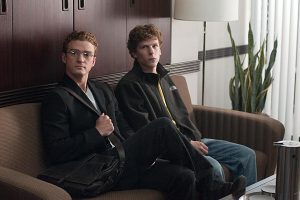
From the start, The Social Network is a barrage of words as relentless as a Twitter stream. David Fincher’s fictionalised account of the founding of Facebook doesn’t pause for breath as it fires off its sound bites and zingers at a rate of about a zillion a minute to compress Aaron Sorkin’s dense 162-page script into a concise two-hour film.
Fincher takes the potentially dull subject of the birth of the world’s largest social networking platform at Harvard and turns it into a compelling story of betrayal that rides on top-notch acting and scripting.
The contentious thesis of the film is that Mark Zuckerberg (played by Jesse Eisenberg) stole the idea for his social network site from Tyler and Cameron Winklevoss, a pair of jocks who would later row for the US at the Beijing Olympics.
The film also alleges that a jealous Zuckerberg cheated his best friend and Facebook co-founder, Eduardo Saverin (played by Andrew Garfield, the next Spiderman), out of his rightful share in their business. The film is framed by the legal depositions that Zuckerberg faced from the three men that he supposedly backstabbed on his way to becoming the world’s youngest billionaire.
As breathlessly hyped-up as the latest Web 2.0 fad, The Social Network currently has a 97% approval rating on Rotten Tomatoes and seems like a dead certainty to be named the film of the year by many of the world’s most influential critics.
It’s perhaps not quite as good as its publicity may suggest, but The Social Network is a cracking piece of entertainment. Fincher keeps his film moving along at a breakneck speed, with the steely tones of its cinematography and its brooding Nine Inch Nails score infusing it with the loathing and paranoia of a political thriller.
Sorkin — the scribe responsible for The West Wing — packs his script with quotable dialogue that cuts to the marrow of his characters.

Fincher has facetiously compared his film to Citizen Kane, Orson Welles’s brilliant hatchet job on the newspaper magnate, William Randolph Hearst.
If the Welles movie was a detective story about the search for an old media man’s soul, Fincher’s film is a courtroom drama where a new media guy’s apparent lack of one is put on trial.
Zuckerberg — whose defiant, defensive manner are brilliantly captured by Eisenberg’s performance — is unsparingly depicted as a near-sociopathic nerd who is driven to create his Web site to get his own back on a Harvard establishment that excludes him and on the girl that coldly but justifiably dumps him in the first scene of the film.
He is all frosty rage, arrogance, petulance and calculation — an outsider who will do anything to prove that he is above the cliques that excluded him and the girls that rejected him.
Zuckerberg’s adversaries aren’t portrayed in a much more flattering light. The Winklevoss twins — the WASP elites that Zuckerberg allegedly stole the idea for Facebook from — are swollen with self-importance and their sense of entitlement, while Saverin is a whiny naïf.
One of the film’s revelations is Justin Timberlake’s star turn as Napster founder Sean Parker, an early partner in Facebook. Parker, as Timberlake plays him, is a pretentious pop-star who delivers rhetoric about changing the world through the Internet, rhetoric that serves as an empty excuse for his sex and drugs lifestyle.
Isn’t it ironic, the film suggests, that social misfits like Zuckerberg have created the tools that are supposedly changing the way the world communicates? And that Facebook was initially created as a cool and exclusive club rather than a party everyone is invited to?
The Social Network trailer (via YouTube):
The skeleton of the film has been exhumed from reality — some of Zuckerberg’s LiveJournal entries, courtroom testimonies and articles in the Harvard student newspaper bear witness to the bold outlines of the story.
But the flesh that covers the frame, the motivations of the characters, is all from the imaginations of Sorkin and Fincher.
That scarcely matters — great Hollywood biopics from Kane to Patton have always taken some liberties with the facts in service of dramatic truth. In this case, The Social Network captures the spirit of this time as successfully as Fincher’s Fight Club bottled the zeitgeist of 1999.
It’s a cynical stab at the elitism, rancour and opportunism on the dark side of Web 2.0 and a timely counterbalance to the gushing optimism that the social media consultants are selling. — Lance Harris, TechCentral
- Subscribe to our free daily newsletter
- Follow us on Twitter or on Facebook




